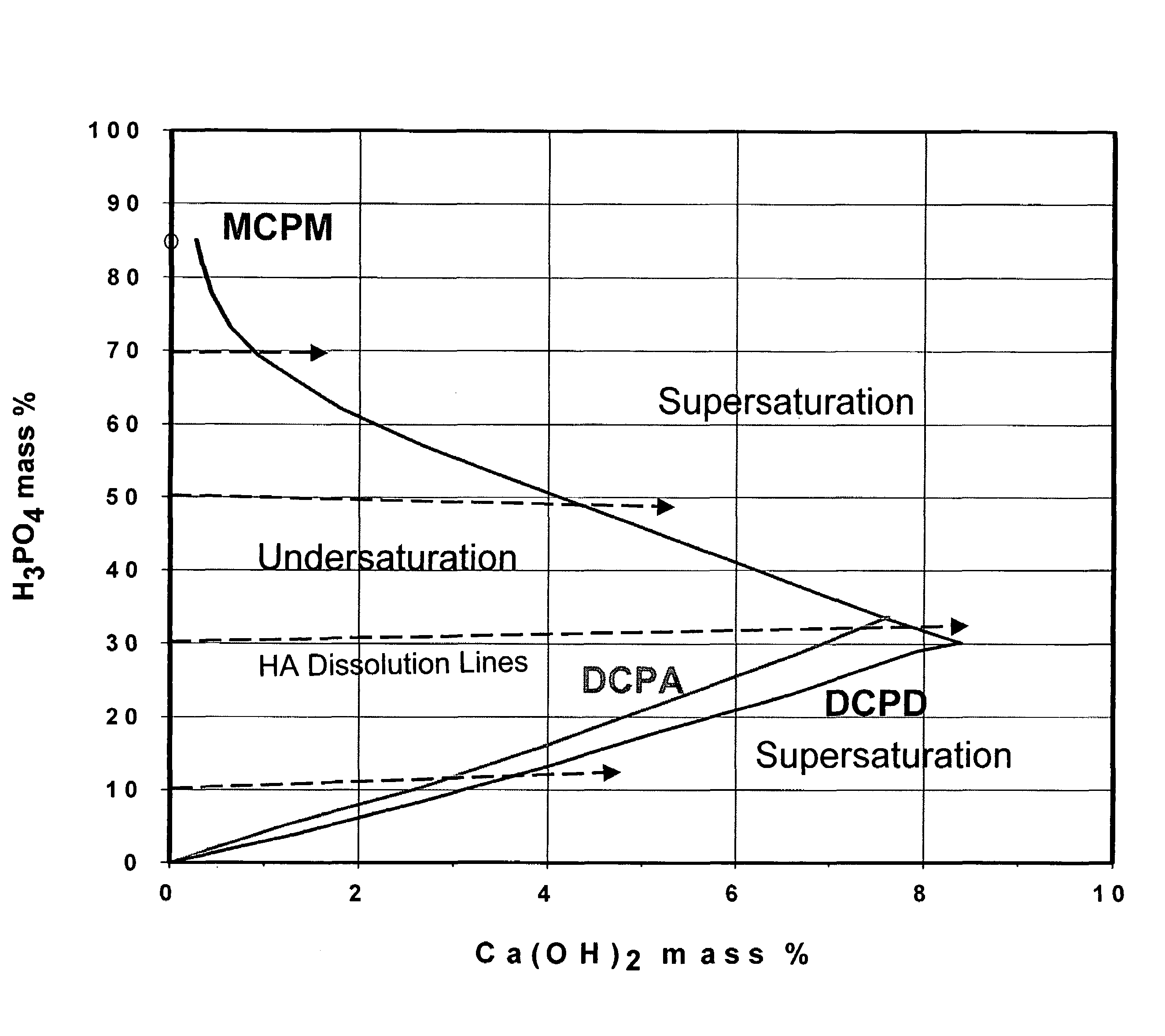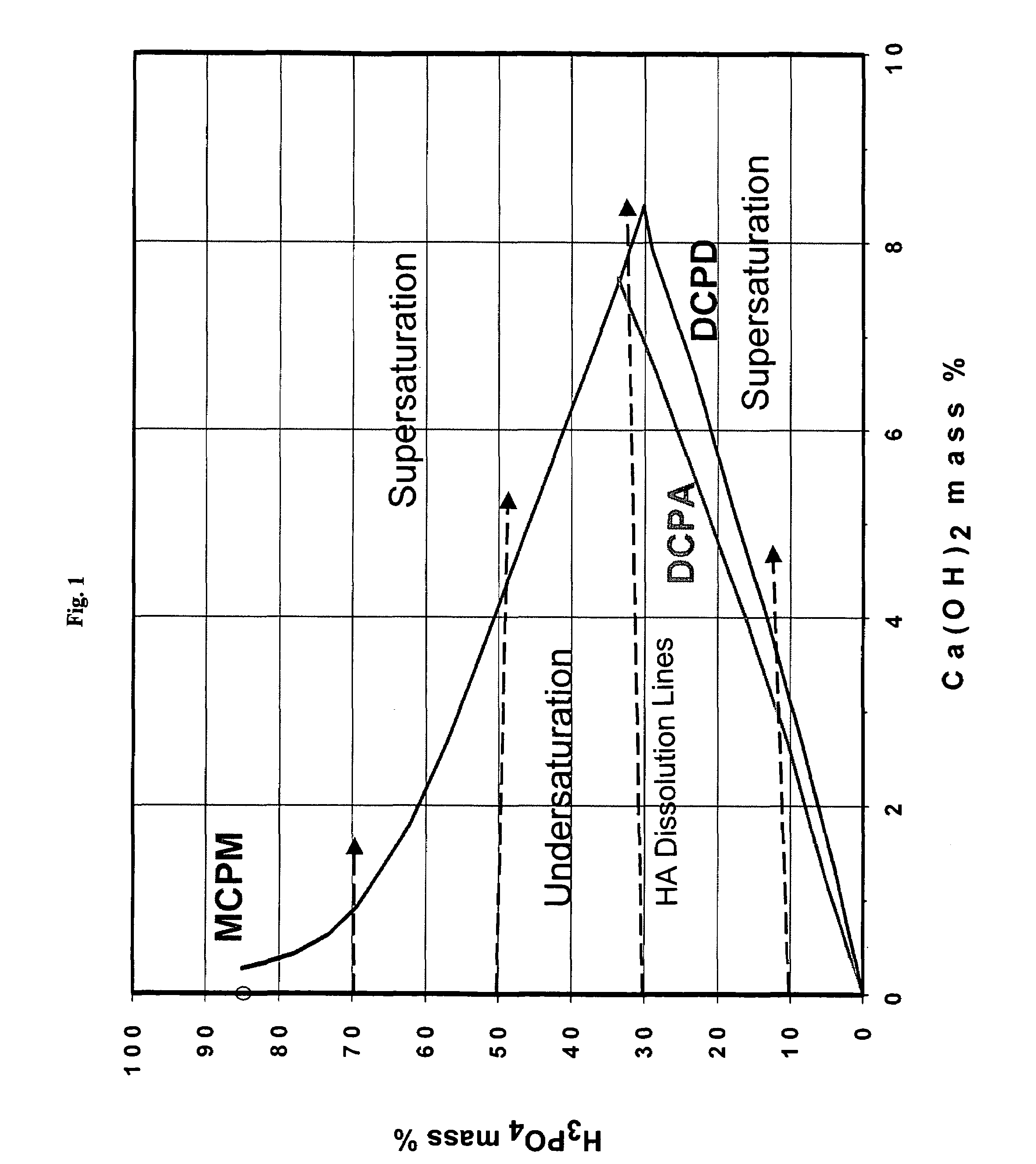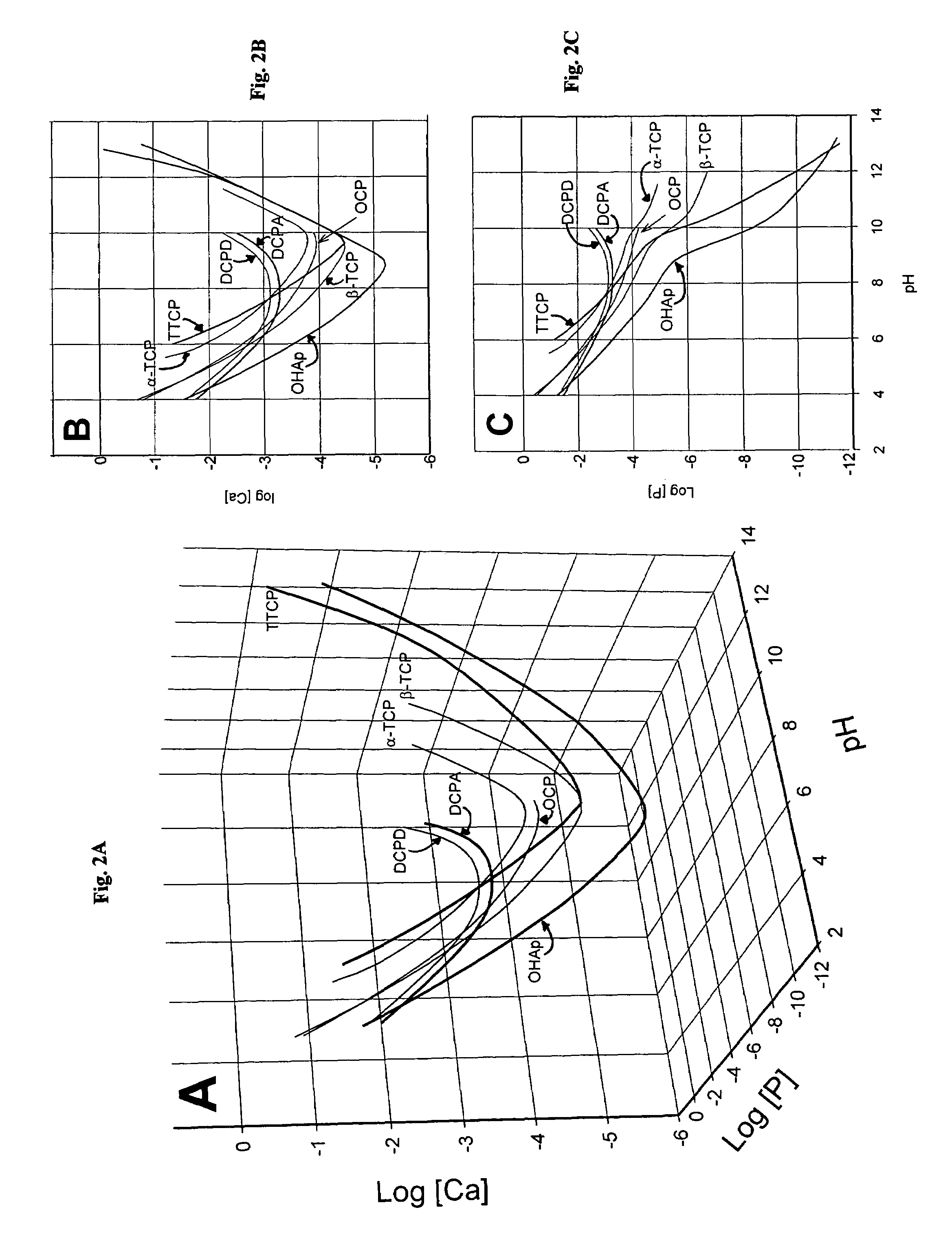Rapid-hardening calcium phosphate cement compositions
a technology cement composition, which is applied in the field of self-hardening calcium phosphatecontaining and/or calciumcontaining paste and cement composition, can solve the problems of poor washout resistance of premixed cpc-glycerol paste, and achieve the effects of promoting rapid setting of calcium phosphate cement, reducing hardening times, and resisting washou
- Summary
- Abstract
- Description
- Claims
- Application Information
AI Technical Summary
Benefits of technology
Problems solved by technology
Method used
Image
Examples
example 1
[0054]In this example, a MCPM-forming solution having a pH of about 1, a calcium concentration of about 0.66 M, and a phosphorus concentration of about 7.6 M is used as the cement liquid. This solution is prepared by stirring an excess amount of MCPM in a solution of H3PO4 (about 6.3 M) until equilibrium, followed by filtration.
[0055]The powders also are mixed with water to provide comparative setting times.
[0056]
TABLE 1SettingSettingtime (min):Productstime (min):MCPMFormedPowderwatersolution(after 24 hours)TTCP and DCPA3090% HAα-TCP and DCPA3090% HADCPA and Ca(OH)2does not setTTCP(Ca: P = 1.9)(17 μm)does not setα-TCP (17 μm)does not set20% HAα-TCP (5 μm)does not set
[0057]This example illustrates that the inventive solutions promote relatively rapid hardening and that the cements do not harden as a result of the cement powders contacting an aqueous solution (water alone).
example 2
[0058]In this example, a DCPD-forming solution having a pH of about 2.1, a calcium concentration of about 1.5 M and a phosphorus concentration of about 4.4 M is used as the cement liquid. The solution is prepared by stirring an excess amount of DCPD in a solution of H3PO4 (about 2.9 M) until equilibrium, followed by filtration. The powders also are mixed with water to provide comparative setting times.
[0059]
TABLE 2SettingSetting TimeProductsTime (min):(min): DCPDCompressiveFormedPowderwatersolutionStrength (MPa)(after 24 hours)TTCP and DCPA30 80% HAα-TCP and CaCO3does not set100% HADCPA and Ca(OH)2does not set 50% HATTCP(Ca: P = 2) (17 μm)does not set30 80% HATTCP(Ca: P = 2) (5 μm)does not set 9.2 (n = 3) 98% HATTCP(Ca: P = 1.95)does not set80-90% HA(20 μm)TTCP(Ca: P = 1.9) (15 μm)does not set3018.9 80% HATTCP(Ca: P = 1.9) (5 μm)does not set10.4 (n = 2)poorly HATTCP(Ca: P = 1.67)does not set21.7 (n = 3)poorly HA(5 μm)α-TCP (5 μm)does not set22.5 (n = 3) 80% HA, 20%DCPDβ-TCP (17 μm)d...
example 3
[0061]In this example, concentrated acid solutions are used as the cement liquid. The powders also are mixed with water to provide comparative setting times.
[0062]
TABLE 3Products formedPowderLiquidSetting time (min)(after 24 hours)TTCP and DCPAwater30 90% HATTCP and DCPA0.016 N HCl 95% poorly HATTCP and DCPA0.063 N HClTTCP and DCPA1.0 N HClTTCP and DCPA0.016 N HNO3 95% poorly HATTCP and DCPA0.032 N HNO315 95% poorly HATTCP and DCPA1.0 N HNO3 95% poorly HATTCP and DCPA0.004 M H3PO425 90% HATTCP and DCPA0.008 M H3PO425 90% HATTCP and DCPA0.016 M H3PO422 90% HATTCP and DCPA0.078 M H3PO420 90% HATTCP and DCPA1.0 M H3PO415 90% HATTCP and DCPA0.016 M acetic acid 97% HATTCP and DCPA0.063 M acetic acidHATTCP and DCPA0.01 M acetic acidHATTCP and DCPA1M acetic acid 97% HATTCP and DCPA0.016 M lactic acid25 90% HATTCP and DCPA0.063 M lactic acid20 90% HATTCP and DCPA1M lactic acid20 90% HATTCP and DCPA3 M glycerolphosphoric acidTTCP and DCPA0.75 M glycerol5phosphoric acidTTCP and DCPA0.19 M gly...
PUM
| Property | Measurement | Unit |
|---|---|---|
| particle sizes | aaaaa | aaaaa |
| particle sizes | aaaaa | aaaaa |
| pore diameter | aaaaa | aaaaa |
Abstract
Description
Claims
Application Information
 Login to View More
Login to View More - R&D
- Intellectual Property
- Life Sciences
- Materials
- Tech Scout
- Unparalleled Data Quality
- Higher Quality Content
- 60% Fewer Hallucinations
Browse by: Latest US Patents, China's latest patents, Technical Efficacy Thesaurus, Application Domain, Technology Topic, Popular Technical Reports.
© 2025 PatSnap. All rights reserved.Legal|Privacy policy|Modern Slavery Act Transparency Statement|Sitemap|About US| Contact US: help@patsnap.com



